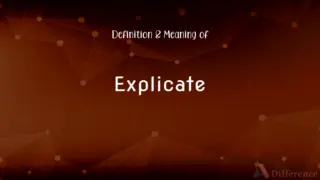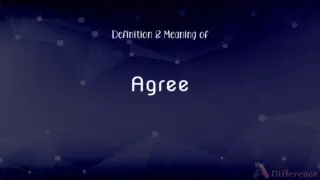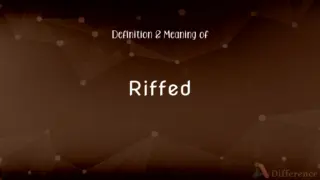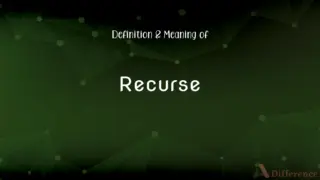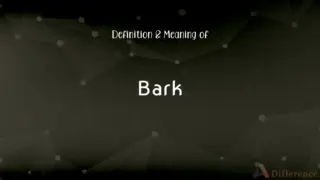Gas Definition and Meaning
Edited by Tayyaba Rehman — By Fiza Rafique — Updated on March 6, 2024
Gas refers to a state of matter characterized by its ability to expand freely and fill any available space. e.g., Helium gas is used to fill balloons.
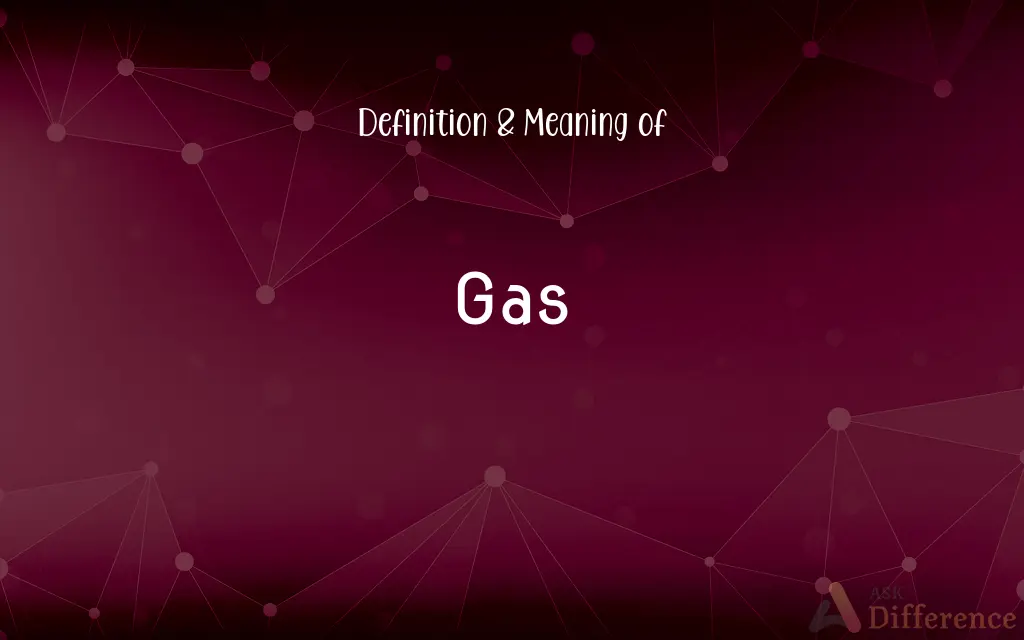
Table of Contents
Gas Definitions
Used metaphorically to describe something exciting or excellent.
That concert was gas!
A term used in colloquial language to refer to gasoline.
I need to put gas in my car.
Informal for talking excessively or boasting.
He's all gas, no action.
In biology, a product of respiration or digestion, like oxygen or carbon dioxide.
Plants release oxygen gas during photosynthesis.
A form of matter that does not have a definite volume or shape.
Air is a mixture of gases.
A term in chemistry for a substance that will spread out freely to fill any available space.
Hydrogen gas is the lightest element.
A fuel, such as natural gas or propane, used for heating or cooking.
We use gas for our kitchen stove.
Air-like substances that can be toxic or harmful, such as chlorine gas.
Gas masks protect against toxic gases.
In physics, one of the four fundamental states of matter.
Water vapor is water in its gas state.
A substance in a form that expands to fill any container without a fixed shape.
Methane gas is flammable.
The state of matter distinguished from the solid and liquid states by relatively low density and viscosity, relatively great expansion and contraction with changes in pressure and temperature, the ability to diffuse readily, and the spontaneous tendency to become distributed uniformly throughout any container.
A substance in the gaseous state.
Any of various mixtures of flammable gases used for lighting, heating, or cooking.
Gasoline.
The speed control of a gasoline engine. Used with the
Step on the gas.
A gaseous asphyxiant, irritant, or poison.
A gaseous anesthetic, such as nitrous oxide.
Flatulence.
Flatus.
(Slang) Idle or boastful talk.
(Slang) Someone or something exceptionally exciting or entertaining
The party was a gas.
To treat chemically with gas.
To overcome, disable, or kill with poisonous fumes.
To give off gas.
(Slang) To talk excessively.
Matter in an intermediate state between liquid and plasma that can be contained only if it is fully surrounded by a solid (or in a bubble of liquid, or held together by gravitational pull); it can condense into a liquid, or can (rarely) become a solid directly by deposition.
A lot of gas had escaped from the cylinder.
(uncountable) A flammable gaseous hydrocarbon or hydrocarbon mixture used as a fuel, e.g. for cooking, heating, electricity generation or as a fuel in internal combustion engines in vehicles, especially natural gas.
Gas-fired power stations have largely replaced coal-burning ones.
Poison gas.
The artillery fired gas shells into the enemy trenches.
A chemical element or compound in such a state.
The atmosphere is made up of a number of different gases.
(countable) A hob on a gas cooker.
She turned the gas on, put the potatoes on, then lit the oven.
(uncountable) Methane or other waste gases trapped in one's belly as a result of the digestive process; flatus.
My tummy hurts so bad – I have gas.
(slang) A humorous or entertaining event or person.
(slang) Frothy or boastful talk; chatter.
(baseball) A fastball.
The closer threw him nothing but gas.
Marijuana, typically of high quality.
, a light derivative of petroleum used as fuel.
Ellipsis of gas pedal
An internal virtual currency used in Ethereum to pay for certain operations, such as blockchain transactions.
Gas fee
(transitive) To attack or kill with poison gas.
The Nazis gassed millions of Jews during the Holocaust.
He never fully recovered after he was gassed on the Western Front.
To talk in a boastful or vapid way; chatter.
To impose upon by talking boastfully.
(intransitive) To emit gas.
The battery cell was gassing.
(transitive) To impregnate with gas.
To gas lime with chlorine in the manufacture of bleaching powder
(transitive) To singe, as in a gas flame, so as to remove loose fibers.
To gas thread
(US) To give a vehicle more fuel in order to accelerate it.
The cops are coming. Gas it!
(US) To fill (a vehicle's fuel tank) with fuel.
(slang) comical, zany; fun, amusing.
Mary's new boyfriend is a gas man.
It was gas when the bird flew into the classroom.
An aëriform fluid; - a term used at first by chemists as synonymous with air, but since restricted to fluids supposed to be permanently elastic, as oxygen, hydrogen, etc., in distinction from vapors, as steam, which become liquid on a reduction of temperature. In present usage, since all of the supposed permanent gases have been liquified by cold and pressure, the term has resumed nearly its original signification, and is applied to any substance in the elastic or aëriform state.
A complex mixture of gases, of which the most important constituents are marsh gas, olefiant gas, and hydrogen, artificially produced by the destructive distillation of gas coal, or sometimes of peat, wood, oil, resin, etc. It gives a brilliant light when burned, and is the common gas used for illuminating purposes.
Same as gasoline; - a shortened form. Also, the accelerator pedal of a motor vehicle; used in the term " step on the gas".
The accelerator pedal of a motor vehicle; used in the term " step on the gas".
Same as natural gas.
An exceptionally enjoyable event; a good time; as, The concert was a gas.
To singe, as in a gas flame, so as to remove loose fibers; as, to gas thread.
To impregnate with gas; as, to gas lime with chlorine in the manufacture of bleaching powder.
To expose to a poisonous or noxious gas
The state of matter distinguished from the solid and liquid states by: relatively low density and viscosity; relatively great expansion and contraction with changes in pressure and temperature; the ability to diffuse readily; and the spontaneous tendency to become distributed uniformly throughout any container
A fluid in the gaseous state having neither independent shape nor volume and being able to expand indefinitely
A volatile flammable mixture of hydrocarbons (hexane and heptane and octane etc.) derived from petroleum; used mainly as a fuel in internal-combustion engines
A state of excessive gas in the alimentary canal
A pedal that controls the throttle valve;
He stepped on the gas
A fossil fuel in the gaseous state; used for cooking and heating homes
Attack with gas; subject to gas fumes;
The despot gassed the rebellious tribes
Show off
Gas Snonyms
Fume
Gas, smoke, or vapor that smells strongly or is dangerous to inhale.
The fumes from the chemical spill were hazardous.
Steam
The vapor into which water is converted when heated, forming a white mist of minute water droplets in the air.
The kettle was letting off steam.
Aerosol
A suspension of fine solid particles or liquid droplets in air or another gas.
Sprays release aerosol into the air.
Vapor
A substance diffused or suspended in the air, especially one normally liquid or solid.
Water vapor forms clouds in the sky.
Exhaust
Waste gases or air expelled from an engine, turbine, or another machine in the course of its operation.
The car's exhaust was visibly polluting the air.
Smog
Fog or haze combined with smoke and other atmospheric pollutants.
The city was covered in a thick smog.
Mist
A cloud of tiny water droplets suspended in the atmosphere at or near the earth's surface that limits visibility (to a lesser extent than fog).
The morning was cold and filled with mist.
Effluvium
An unpleasant or harmful odor, secretion, or discharge.
The effluvium from the waste facility was overwhelming.
Emanation
A substance or form of radiation given off by something.
The cave's emanations were toxic to those who entered.
Emission
The production and discharge of something, especially gas or radiation.
The factory's emissions were found to be above the legal limit.
Gas Idioms & Phrases
Gas up
To refill a vehicle's fuel tank.
Let's gas up the car before we hit the road.
Step on the gas
To hurry up or go faster.
We're running late, so step on the gas!
Gas pedal
The pedal in a vehicle that controls the engine's power.
Press the gas pedal gently to accelerate.
Run out of gas
To lose energy or become exhausted.
Halfway through the marathon, I completely ran out of gas.
Gas station
A place where fuel for vehicles is sold.
We stopped at a gas station to buy snacks.
Gas chamber
A sealed room used for executing prisoners with poisonous gas.
The gas chamber was a method of execution in the past.
Put the gas on
To apply pressure or speed up a process.
The boss is putting the gas on to meet the deadline.
Pass gas
A polite way of saying to expel intestinal gas.
It's natural for everyone to pass gas occasionally.
Gas guzzler
A vehicle that consumes fuel inefficiently.
That old truck is a real gas guzzler.
Throw a gas on the fire
To make a situation worse.
Arguing about politics at dinner just throws gas on the fire.
Gas giant
A large planet composed mostly of gases.
Jupiter is the largest gas giant in our solar system.
Gas leak
An accidental release of gas, usually dangerous.
The area was evacuated due to a gas leak.
Gas bag
Someone who talks excessively and pointlessly.
Don't get stuck talking to the office gas bag.
Gas money
Money given to contribute to fuel costs.
Can you chip in for gas money since I'm driving?
In the gas
In a state of excitement or high energy.
The team was in the gas after the big win.
As fast as gas
Very quickly or instantaneously.
News of the scandal spread as fast as gas.
Gas and go
To refuel quickly without other services.
Just gas and go; we're in a hurry.
Gas Example Sentences
Laughing gas makes you feel giddy and lighthearted.
The balloon floated away because it was filled with helium gas.
Scientists study various gases in the atmosphere to understand climate change.
Our house is heated by natural gas.
Gas stoves are preferred by many chefs for cooking.
The factory's emissions released harmful gases into the air.
The dentist used laughing gas to help the patient relax.
The car won't start because it's out of gas.
When water boils, it turns into steam, which is a gas.
In space, there are vast clouds of gas and dust.
During the experiment, we observed the gas produced by the chemical reaction.
Gas molecules move faster when heated.
The gas leak in the building caused an evacuation.
Carbon dioxide is a gas that plants use for photosynthesis.
Gasoline, or gas for short, is essential for most vehicles.
Common Curiosities
Why is it called gas?
The term "gas" is derived from the Greek word "chaos," referring to the chaotic, free-moving nature of gases.
What is a stressed syllable in gas?
In the word "gas," the single syllable is stressed.
How is gas used in a sentence?
Gas is often used to refer to substances like air or fuel, e.g., We need to refill the car with gas.
What is the pronunciation of gas?
Gas is pronounced as /ɡæs/.
What is the verb form of gas?
The verb form is "to gas," meaning to fill with gas or to expose to gas.
How do we divide gas into syllables?
As a single-syllable word, "gas" is not divided into smaller syllables.
What part of speech is gas?
"Gas" is primarily a noun, but it can also function as a verb.
How many syllables are in gas?
Gas has one syllable.
What is the root word of gas?
The root word of "gas" is derived from the Dutch "gass," which was coined by chemist J.B. van Helmont.
What is the second form of gas?
The second form (past tense) of "to gas" is "gassed."
What is the singular form of gas?
The singular form is "gas."
What is the plural form of gas?
The plural form is "gases."
Is gas a noun or adjective?
Gas is primarily a noun.
Is gas an abstract noun?
No, "gas" is a concrete noun as it refers to a physical substance.
What is the third form of gas?
The third form (past participle) of "to gas" is also "gassed."
Is the word gas imperative?
"Gas" can be used in an imperative form, as in "Gas the car."
What is the first form of gas?
The first (base) form of the word is "gas."
What is another term for gas?
Another term for gas is "vapor" or "fume."
What is the opposite of gas?
The opposite of gas, in terms of states of matter, is "solid."
Is the gas term a metaphor?
"Gas" can be used metaphorically in some contexts, such as "He's all gas."
Which determiner is used with gas?
Determiners like "some," "the," or "this" can be used with "gas."
Which vowel is used before gas?
The vowel used before "gas" depends on the article or adjective, e.g., "a" as in "a gas leak."
Is gas a vowel or consonant?
The word "gas" starts with a consonant sound.
Is gas a countable noun?
"Gas" can be countable or uncountable depending on the context.
Is the word gas Gerund?
No, "gas" itself is not a gerund; the gerund form would be "gassing."
Is the word “gas” a Direct object or an Indirect object?
"Gas" can serve as a direct object, as in "I need to buy gas."
Which conjunction is used with gas?
Conjunctions like "and" or "but" can be used in sentences involving "gas."
Which article is used with gas?
Both "a" and "the" can be used with "gas," depending on the context.
Is gas a negative or positive word?
"Gas" is neutral; its connotation depends on the context.
Is gas a collective noun?
No, "gas" is not typically used as a collective noun.
Is gas an adverb?
No, "gas" is not an adverb.
Which preposition is used with gas?
Prepositions like "with," "for," and "from" can be used with "gas."
Share Your Discovery

Previous Term
Enthusiastic Definition and Meaning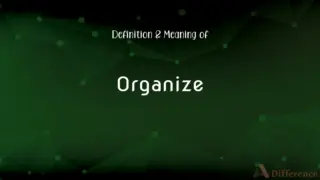
Next Term
Organize Definition and MeaningAuthor Spotlight
Written by
Fiza RafiqueFiza Rafique is a skilled content writer at AskDifference.com, where she meticulously refines and enhances written pieces. Drawing from her vast editorial expertise, Fiza ensures clarity, accuracy, and precision in every article. Passionate about language, she continually seeks to elevate the quality of content for readers worldwide.
Edited by
Tayyaba RehmanTayyaba Rehman is a distinguished writer, currently serving as a primary contributor to askdifference.com. As a researcher in semantics and etymology, Tayyaba's passion for the complexity of languages and their distinctions has found a perfect home on the platform. Tayyaba delves into the intricacies of language, distinguishing between commonly confused words and phrases, thereby providing clarity for readers worldwide.














